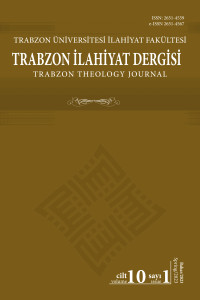Osman b. Saîd ed-Dârimî’ye Göre Kur’an ve Yorumu
Quran and its interpretation according to ʻUthman ibn Saʻīd al-Dārimī
Author(s): Kadir EserSubject(s): Islam studies, Sociology of Religion, Qur’anic studies
Published by: Karadeniz Teknik Üniversites - İlahiyat Fakültesi
Keywords: Tafsīr; Dārimī; Creation of the Qur’an (khalq al-Qur’an); Narration; Context; Interpretation;
Summary/Abstract: The thought of Ahl al-ḥadīth, which emerged as a reaction movement in a period when the pressure of different cultures on Islamic-Arab culture increased, crystallized in the mihna process. The outcome of the mihna process in favor of the Ahl al-ḥadīth has elevated the thought of the Ahl al-ḥadīth to a decisive position on Islamic thought. In order to understand the Islamic thought and scientific tradition in a healthy way, the thought of Ahl al-ḥadīth should be handled from different perspectives. Generally, the method of examining the issues of Ahl al-ḥadīth is to compile the narrations related to the subject from the narration heritage and to express their own thoughts through narration texts. One of the exceptions to this is Dārimī. He defended the thoughts of Ahl al-ḥadīth in a theological style in his works. Therefore, he has important contributions to the systematization of the Ahl al-ḥadīth thought. In this study, the views of Dârimî, who is one of the important representatives of Ahl al-ḥadīth thought, on the Qur'an and its interpretation are discussed. With this study, it is aimed to reveal the approach of the Ahl al-ḥadīth about the Qur'an and its interpretation, in particular Dārimī. Discuss in his views from different aspects will contribute to the understanding of the Ahl al-ḥadīth thought with all its dimensions. Literature review, document analysis and description method were used in the study. Dārimī's works that have survived to the present day were scanned and the data obtained were analyzed and transferred to the study. The main problem that Darimi deals with regarding the Qur'an is the issue of the creation of the Qur'an. According to him, the Qur'an was not created because it is a word from God. He used the Qur'an, the Sunnah, the views of the Ṣaḥābah and the Tābiʻīn as a source in his tafsīr. According to him, tafsīr is a matter of narration. Because narrations give the meaning of text. It is a deviation to go beyond the meaning that the narrations describe and to move away from the literal meaning. Dārimī often emphasizes the context in understanding the Qur'an and determining the meaning of the word, and argues that the meaning emerges in the context. Therefore, he is based on the literal meaning obtained from the context of the text and the general use of language.
Journal: Trabzon İlahiyat Dergisi
- Issue Year: 10/2023
- Issue No: 1
- Page Range: 163-189
- Page Count: 27
- Language: Turkish

